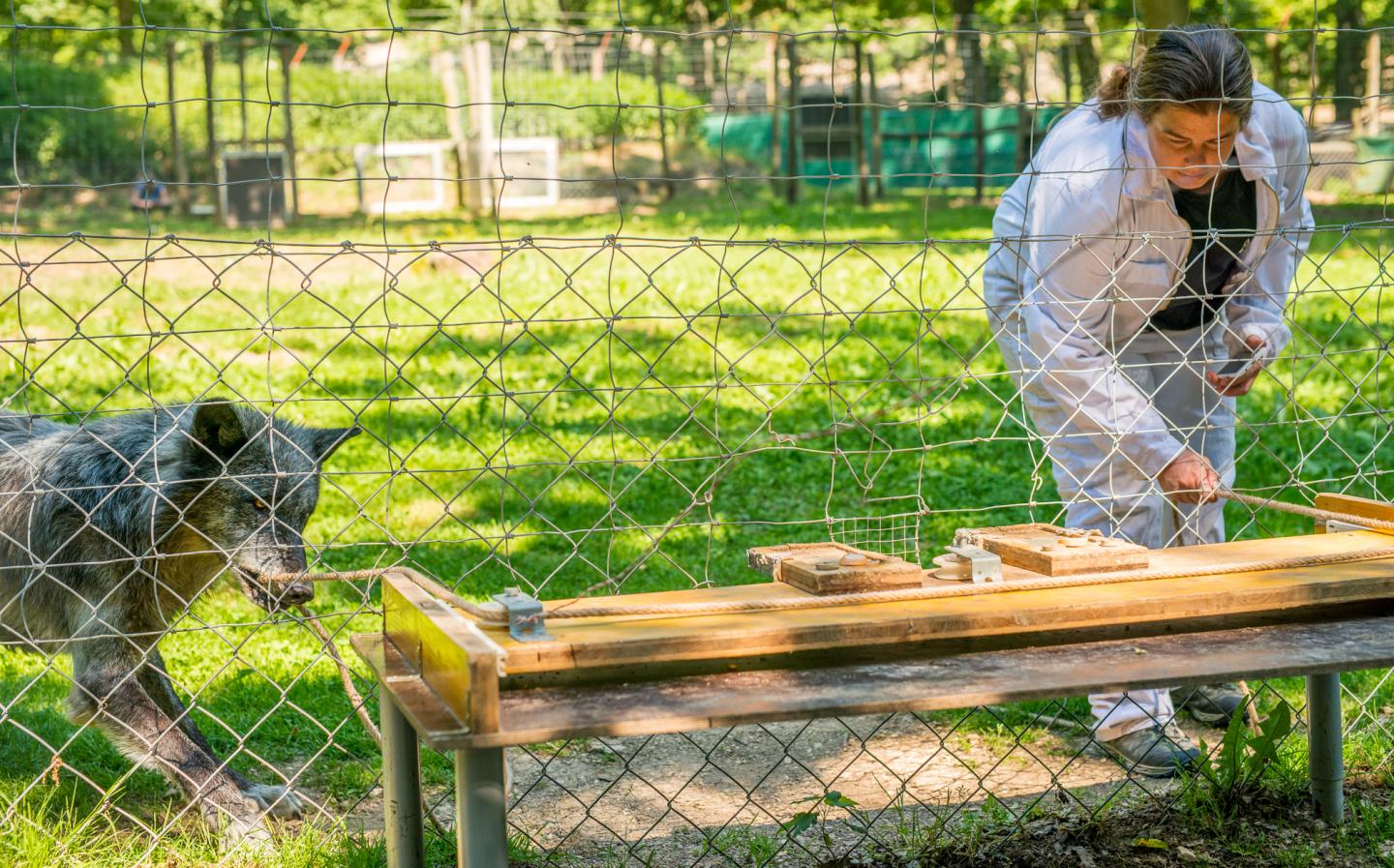
Credit: Friederike Range/Vetmeduni Vienna
Human social life would be unthinkable without cooperation. The frequency and complexity with which humans cooperate with each other are extraordinary, if not unique. To better understand the evolution of this outstanding human skill, researchers have proposed dogs (Canis familiaris) as a good model of human cooperation.
The wolf inside dogs makes the difference
A recent study by Vetmeduni Vienna, published in the journal Scientific Reports, shows that the ability to work with people lies not so much within dogs themselves but in the “wolf within the dog” – that is to say, in very specific behavioural characteristics that dogs share with wolves. The study tested the extent to which dogs and grey wolves collaborate with humans in order to solve certain tasks. The findings show that both dogs and wolves cooperate intensively with humans and are equally successful, although the animals attain their goals in different ways.
Wolves show more initiative
Especially in one point the two closely related animals show significantly different forms of behaviour. In their cooperation with human partners, dogs follow the behaviour of the humans while wolves lead the interaction: they are more independent. Study director Friederike Range from the Konrad Lorenz Institute at Vetmeduni Vienna says, “The detailed analysis of the cooperative interactions revealed interesting differences between wolves and dogs. It shows that, while wolves tend to initiate behaviour and take the lead, dogs are more likely to wait and see what the human partner does and follow that behaviour.”
Differences in behaviour due to domestication
Based on the results of the study, the researchers propose that in the course of domestication dogs were selected for breeding because of their higher submissive tendencies (deferential behaviour hypothesis). According to this hypothesis, this helped minimize conflicts over resources and ensured the safe coexistence and cooperation in which humans lead and dogs follow.
Teamwork counts for wolves
Forming the background to the study are certain fundamental considerations in the field of behavioural science. As humans and dogs have been exposed to similar environmental pressures, this could conceivably represent a case of convergent evolution. Some research suggests that dogs acquired specific predispositions for cooperative interactions during the domestication process due to reduced aggression and increased tolerance. Against this background, better cooperation with humans would be expected in dogs than in wolves. However, wolves are a highly cooperative species, working together to raise the young, hunt and defend their territory.
Early socialization with humans is crucial
The research team led by Friederike Range therefore hypothesized that dogs did not develop any new traits during domestication, but rather that the collaborative skills of their common ancestors – wolves – form the basis for the evolution of dog-human cooperation (canine cooperation hypothesis). In contrast to the hypotheses of other scientists, the researchers from Vetmeduni Vienna therefore did not assume that dogs will outperform wolves when cooperating with humans. As Friederike Range says, “Based on the canine cooperation hypothesis, we expected that wolves would cooperate with humans as well as dogs if early and intensive socialization is given.” The present study fully confirms this assumption.
For the experiment portion of the study, 15 grey wolves (11 males, 4 females, age: 2 to 8 years) and 12 mixed-breed dogs (7 males, 5 females, age: 2 to 7 years) were tested at the Wolf Science Center in Ernstbrunn, Austria, where animals are socialized with people very early on and have close ties to them. The results of the experiment show that dogs and wolves, when socialized with humans and kept under similar conditions, work similarly successfully with humans, albeit in very different ways, which explains why dogs make the better pet.
###
Service:
The article “Wolves lead and dogs follow, but they both cooperate with humans” by Friederike Range, Sarah Marshall-Pescini, Corinna Kratz and Zsófia Virányi was published in Scientific Reports.
https:/
About the University of Veterinary Medicine, Vienna
The University of Veterinary Medicine, Vienna in Austria is one of the leading academic and research institutions in the field of Veterinary Sciences in Europe. About 1,300 employees and 2,300 students work on the campus in the north of Vienna which also houses five university clinics and various research sites. Outside of Vienna the university operates Teaching and Research Farms. The Vetmeduni Vienna plays in the global top league: in 2018, it occupies the excellent place 6 in the world-wide Shanghai University veterinary in the subject “Veterinary Science”. http://www.
Scientific Contact:
Friederike Range
Konrad-Lorenz-Institute of Ethology
University of Veterinary Medicine Vienna (Vetmeduni Vienna)
T +43 1 25077-2685
[email protected]
Released by:
Georg Mair
Science Communication / Corporate Communications
University of Veterinary Medicine Vienna (Vetmeduni Vienna)
T +43 1 25077-1165
[email protected]
Media Contact
Friederike Range
[email protected]
Original Source
https:/




